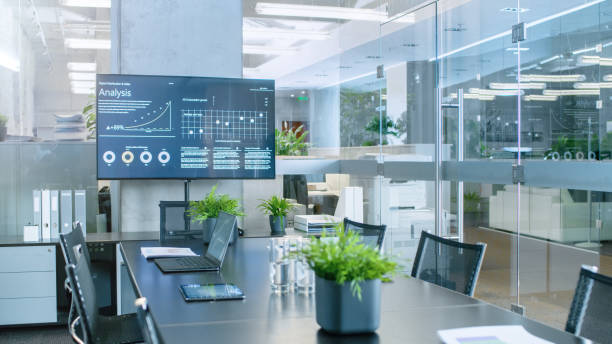Serviced Offices and Technological Innovation in the Workplace
The landscape of work is evolving at a breakneck pace, driven by a relentless wave of technological innovation. For small businesses and companies navigating the bustling real estate market, the rise of serviced offices isn’t just a trend, it’s a game changer. These flexible workspaces are no longer mere desks and meeting rooms; they’re hubs of innovation, agility, and connectivity. As technology continues to reshape how we operate, serviced offices stand at the forefront, offering a dynamic environment where ideas can flourish and businesses can adapt on the fly.
Redefining the Office: From Static Space to Dynamic Ecosystem
Gone are the days when the office was just a physical space, a fixed location where employees clocked in and out. Today’s office environment is a living, breathing ecosystem, powered by cutting-edge technology that enhances productivity and collaboration. Serviced offices exemplify this shift, providing not only fully equipped workspaces but also seamless connectivity, smart infrastructure, and integrated digital tools. For small companies and startups, this means access to enterprise-level technology without the hefty investment, enabling them to compete on a larger stage.
In this new era, the office is less about square footage and more about experience. High-speed Wi-Fi, IoT-enabled devices, virtual collaboration platforms, and AI-driven analytics are transforming traditional workspaces into intelligent environments. Serviced offices leverage these innovations to create flexible, scalable solutions that grow with your business. The focus is on agility, allowing companies to pivot quickly, embrace remote work, and harness data-driven insights to refine their operations.
The Power of Connectivity: Embracing Digital Transformation
Connectivity is king in the modern workplace, and serviced offices are designed to maximize it. Fast, reliable internet is the backbone of any successful business today, and serviced office providers understand this implicitly. They invest heavily in infrastructure that ensures minimal downtime and lightning-fast speeds, empowering employees to work efficiently regardless of their location.
Moreover, the integration of smart office technology, such as automated lighting, climate control, and digital booking systems, further enhances the user experience. These innovations don’t just add convenience; they optimize energy usage, reduce costs, and create healthier, more productive environments. For small businesses, this means fewer distractions and more focus on core activities. For larger companies, it translates into smoother operations and an edge in competitive markets.
Collaboration and Innovation: Breaking Down Barriers with Tech
One of the most exciting aspects of technological innovation in serviced offices is how it fosters collaboration. Cloud-based tools like Slack, Microsoft Teams, and Zoom have become staples, enabling teams to connect effortlessly across distances. When combined with the physical design of serviced offices, think open-plan layouts, modular meeting rooms, and shared communal spaces, the result is a fertile ground for innovation.
These workspaces become incubators for ideas, where spontaneous conversations can spark breakthroughs and cross-disciplinary collaboration becomes second nature. Advanced AV equipment, virtual whiteboards, and digital signage further break down barriers, making remote and in-person teams feel like part of the same ecosystem. For small businesses, this environment offers access to enterprise-grade technology that might otherwise be out of reach, leveling the playing field and fueling growth.
The Future of the Office: Smart, Sustainable, and Seamlessly Integrated
Looking ahead, the future of serviced offices is undeniably intertwined with technological progress. Smart offices will become even more intuitive, learning from user habits to optimize comfort and efficiency. Artificial intelligence will play a bigger role, offering predictive maintenance, personalized work environments, and data-driven insights that inform business decisions.
Sustainability will also be a key focus, with green technologies integrated into smart office solutions to reduce carbon footprints. Energy-efficient lighting, smart HVAC systems, and digital resource management will make these spaces not only innovative but also environmentally responsible. For small businesses and real estate investors alike, this confluence of innovation and sustainability presents a compelling opportunity to redefine the workplace for the modern age.
Conclusion: Embracing the Digital Revolution in Office Spaces
In the end, serviced offices are more than just convenient workspaces, they are the crucibles of technological innovation in the workplace. For small businesses looking to scale and larger companies seeking agility, these flexible environments offer the perfect platform to harness the power of digital transformation. As technology continues to evolve, so too will the office, becoming smarter, more sustainable, and more connected than ever before.
The message is clear: the future belongs to those who embrace innovation. And in the realm of office and serviced office spaces, that future is now. Companies that leverage these advancements will not only stay ahead of the curve, they will shape the future of work itself.

Do not hesitate to contact us
Get in touch, if you have any question

